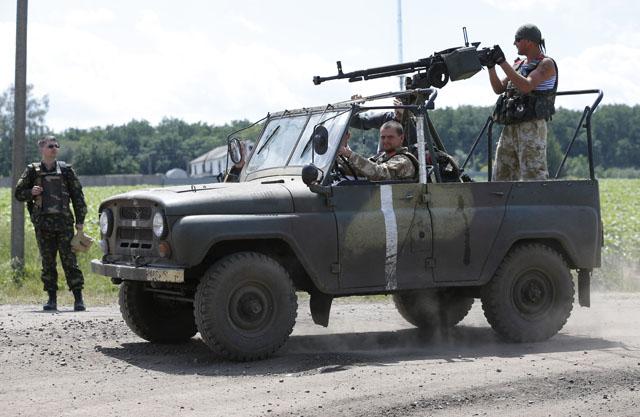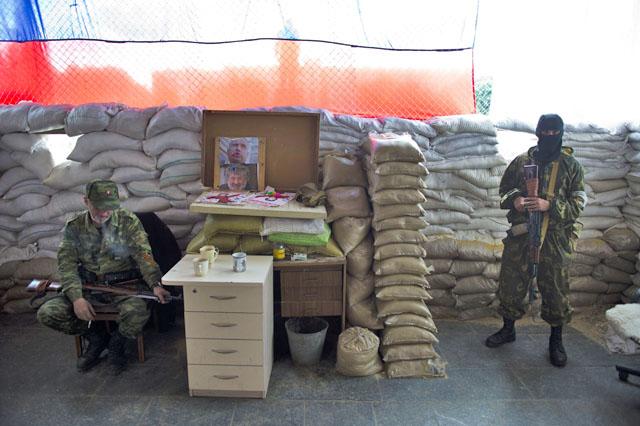You are here
Putin moves to scrap option to invade Ukraine
By AFP - Jun 24,2014 - Last updated at Jun 24,2014

MOSCOW — Russian President Vladimir Putin on Tuesday asked lawmakers to revoke a resolution allowing him to invade Ukraine in a shock turnabout that Kiev hailed as his “first practical step” towards helping defuse the crisis.
The surprise reversal from the Kremlin strongman comes amid the threat of tougher Western sanctions against Moscow and could help spur fragile peace initiatives to end fighting in eastern Ukraine after pro-Russian rebels agreed Monday to a temporary government ceasefire.
Putin’s spokesman Dmitry Peskov said the decision to reverse the March 1 vote giving Putin carte blanche to send troops into Ukraine was aimed at “normalising the atmosphere and resolving the situation” where over 370 people have been killed since April.
In a rare sign of agreement Ukraine’s Western-backed President Petro Poroshenko welcomed the announcement as “the first practical step taken by the Russian president in the wake of his decision to officially support Ukraine’s settlement plan for the [eastern] Donbass region”.
Senators in Russia’s rubber-stamp legislative body will vote Wednesday to rescind the decision which saw troops massed along the border in what was seen as a threat of intervention.
German Foreign Minister Frank-Walter Steinmeier told journalists after meeting Poroshenko in Kiev that “appropriate signals” were needed from all sides and that both rebels and the Ukrainian army had to stick to the ceasefire.
On the ground in eastern Ukraine fighting still bubbled away — albeit at a lower intensity — with Poroshenko saying that one serviceman was killed as insurgent attacks continued overnight.
That came despite a prominent rebel leader on Monday reversing his firm rejection of Kiev’s peace overtures by agreeing to a ceasefire and suggesting talks with the authorities.
“We hope that during the period in which both sides halt fire, we will be able to agree and begin consultations about holding negotiations about a peaceful settlement to the conflict,” Alexander Borodai, prime minister of the self-declared Donetsk People’s Republic said in a broadcast by Russian television.
New sanctions threat
Poroshenko has been lobbying world leaders to follow through with their threat to unleash devastating economic sanctions against Russia should Putin fail to immediately end his perceived military and diplomatic backing of the insurgents.
Putin’s volte-face came shortly ahead of a visit to Vienna Tuesday where he was expected to face renewed pressure from his counterpart Heinz Fischer and Switzerland’s Didier Burkhalter — the current head of the Organisation for Security and Cooperation in Europe (OSCE).
While in the Austrian capital Putin oversaw a deal between state energy giant Gazprom and Austria’s OMV approving a section of a Kremlin-backed pipeline project to Europe that has become the focus of new pressure as tensions have grown over Ukraine.
Putin’s reversal follows a conversation with US President Barack Obama Monday evening, the first since the beginning of the month, in which Obama threatened Putin with new sanctions if Moscow failed to stop the flow of weapons to Ukraine.
Ukraine’s president will sign a historic EU trade pact on Friday that crowns his May 25 election promise to make the decisive move westward — one strongly resisted by Russia and that lies at the heart of the current unrest.
Poroshenko’s office said he told US Vice President Joe Biden on Monday night that the rebels’ ceasefire “must be accompanied by the release of hostages and a sealing of the border to halt the entry into Ukraine from Russia of mercenaries, weapons and drugs.”
“Poroshenko stressed that now, Russia must demonstrate real steps forward,” his office said in a statement.
The European Union warned after a meeting of foreign ministers Monday that it expected to see action from Putin “within days”.
Some analysts believe that Putin is still smarting from the sudden loss of an ally in Kiev — ousted by pro-EU protesters in February — who could have brought Ukraine into a new alliance of post-Soviet nations being assembled by the Kremlin.
The subsequent flow of heavy weapons and gunmen across the porous border into eastern Ukraine seem to indicate that the Kremlin is — at the very least — turning a blind eye to local Russian officials and military commanders’ efforts to support the insurgents.
But the Kremlin chief seems equally determined to avoid steps that could trigger broader sanctions and deal a further blow to a Russian economy that is already teetering on the edge of a recession.
Related Articles
Ukraine’s new Western-backed leader sought urgent talks with Russian President Vladimir Putin on Wednesday after separatist rebels shot down an army helicopter despite orders from their own commander to observe a fragile truce.
Ukraine’s new Western-backed President Petro Poroshenko got down on Sunday to the Herculean task of pacifying a deadly pro-Kremlin insurgency and averting a devastating Russian gas cut.
Western-backed tycoon Petro Poroshenko vowed Saturday to avert civil war and mend ties with Russia after being sworn in as Ukraine’s fifth post-Soviet president with the nation facing disintegration and economic collapse.













